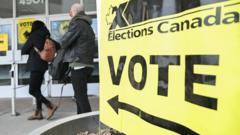As voters prepare to make their choices, the Canadian political landscape has been markedly altered from expectations at the year's beginning. The Conservatives, previously anticipated to dominate the contest, now face a tight race with Prime Minister Mark Carney's Liberals, benefiting from nationalistic sentiments stirred by Trump's comments. The final stages of the campaign were overshadowed by a tragic car ramming incident in Vancouver, adding urgency to the political discourse that centers around leadership challenges and the nation’s relationship with the U.S.
Canada Faces Critical Election Amid Trump's Influence

Canada Faces Critical Election Amid Trump's Influence
Canadians head to the polls on Monday in a high-stakes election shaped significantly by U.S. President Donald Trump's actions and rhetoric.
As Canadians gear up for the polls, the impending election takes on new significance in the wake of U.S. President Donald Trump’s recent threats and tariffs aimed at Canada. Initially, the Conservative Party was expected to sweep the elections, but the tide turned as Trump’s actions revived national sentiment and reignited support for the incumbent Liberal Party, led by Prime Minister Mark Carney.
The campaign, spanning 36 days, emerged from contrasting beginnings, with the Conservative Party, led by Pierre Poilievre, appearing poised for victory earlier in the year. Nonetheless, recent polling data indicates that the race is much tighter, with final surveys showing a slight lead for the Liberals. Amidst this charged atmosphere, tragic events unfolded in Vancouver where a car rammed into a crowd at a festival, resulting in the deaths of 11 people. This incident prompted an immediate response from party leaders, further influencing the electoral campaign climate.
Following the attack, Carney temporarily canceled a Hamilton event to speak to the nation about unity and resilience. In a bid to connect with the community, Poilievre engaged with constituents in Mississauga, aligning himself with the grief of the Filipino community impacted by the tragedy. Carney’s approach emphasized an imperative to counteract perceived threats from Trump, who has made comments suggesting Canada might better serve as a U.S. state. Carney, utilizing his background as a prominent economist, aims to strengthen ties with reliable trade allies outside the United States, marking a shift in Canadian economic strategy.
In contrast, Poilievre has positioned himself as the candidate for change, directly criticizing the Liberal Party's governance over the past decade, while addressing the mounting frustrations Canadians face regarding housing, affordability, and safety. As polling data indicates vital stakes in Ontario, where significant parliamentary seats rest, the Conservative leader is keen on making headway before the result is finalized.
Smaller parties like the NDP, led by Jagmeet Singh, are likely to lose ground as voter momentum shifts towards the larger parties concerned with Trump's impact. Singh, who also faced personal shock from the Vancouver incident, urges Canadians to vote for his party to ensure a balance of power against dominant federal forces.
Historically, Canada has oscillated between Liberal and Conservative leadership, and while Trump remains an influential but detached factor in the election, the outcome carries implications for bilateral relations. A record turnout among early voters—including over 7 million Canadians casting ballots before election day—signals heightened engagement in the electoral process. Polling opens at 08:30 local time across various regions, with the election's final moments expected to unfold late into the evening, marking a potentially transformative chapter in Canadian politics.
The campaign, spanning 36 days, emerged from contrasting beginnings, with the Conservative Party, led by Pierre Poilievre, appearing poised for victory earlier in the year. Nonetheless, recent polling data indicates that the race is much tighter, with final surveys showing a slight lead for the Liberals. Amidst this charged atmosphere, tragic events unfolded in Vancouver where a car rammed into a crowd at a festival, resulting in the deaths of 11 people. This incident prompted an immediate response from party leaders, further influencing the electoral campaign climate.
Following the attack, Carney temporarily canceled a Hamilton event to speak to the nation about unity and resilience. In a bid to connect with the community, Poilievre engaged with constituents in Mississauga, aligning himself with the grief of the Filipino community impacted by the tragedy. Carney’s approach emphasized an imperative to counteract perceived threats from Trump, who has made comments suggesting Canada might better serve as a U.S. state. Carney, utilizing his background as a prominent economist, aims to strengthen ties with reliable trade allies outside the United States, marking a shift in Canadian economic strategy.
In contrast, Poilievre has positioned himself as the candidate for change, directly criticizing the Liberal Party's governance over the past decade, while addressing the mounting frustrations Canadians face regarding housing, affordability, and safety. As polling data indicates vital stakes in Ontario, where significant parliamentary seats rest, the Conservative leader is keen on making headway before the result is finalized.
Smaller parties like the NDP, led by Jagmeet Singh, are likely to lose ground as voter momentum shifts towards the larger parties concerned with Trump's impact. Singh, who also faced personal shock from the Vancouver incident, urges Canadians to vote for his party to ensure a balance of power against dominant federal forces.
Historically, Canada has oscillated between Liberal and Conservative leadership, and while Trump remains an influential but detached factor in the election, the outcome carries implications for bilateral relations. A record turnout among early voters—including over 7 million Canadians casting ballots before election day—signals heightened engagement in the electoral process. Polling opens at 08:30 local time across various regions, with the election's final moments expected to unfold late into the evening, marking a potentially transformative chapter in Canadian politics.





















